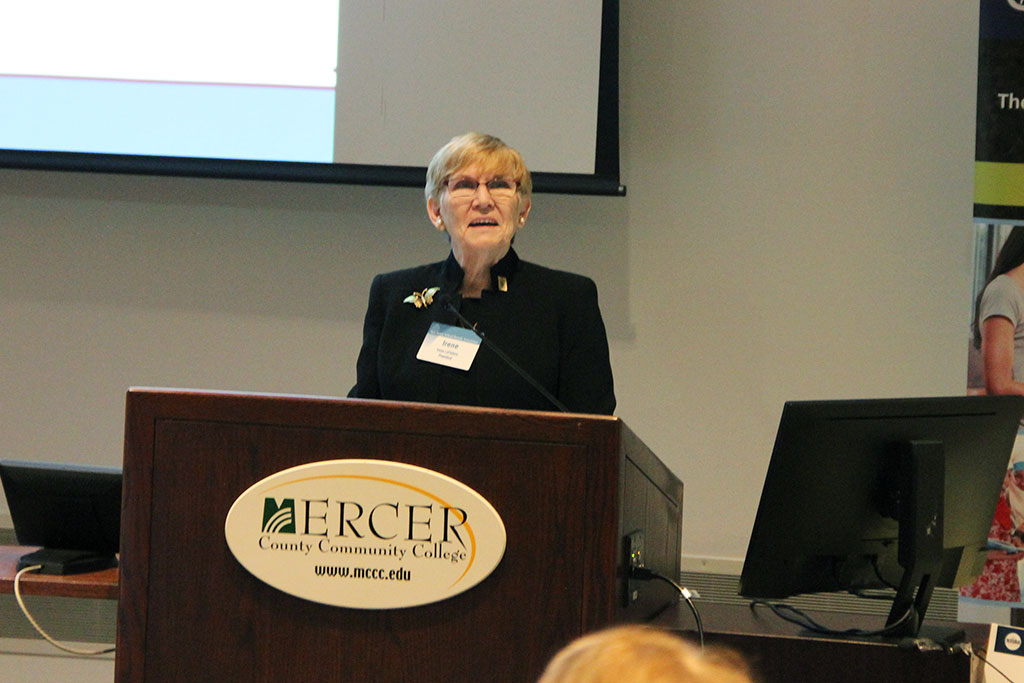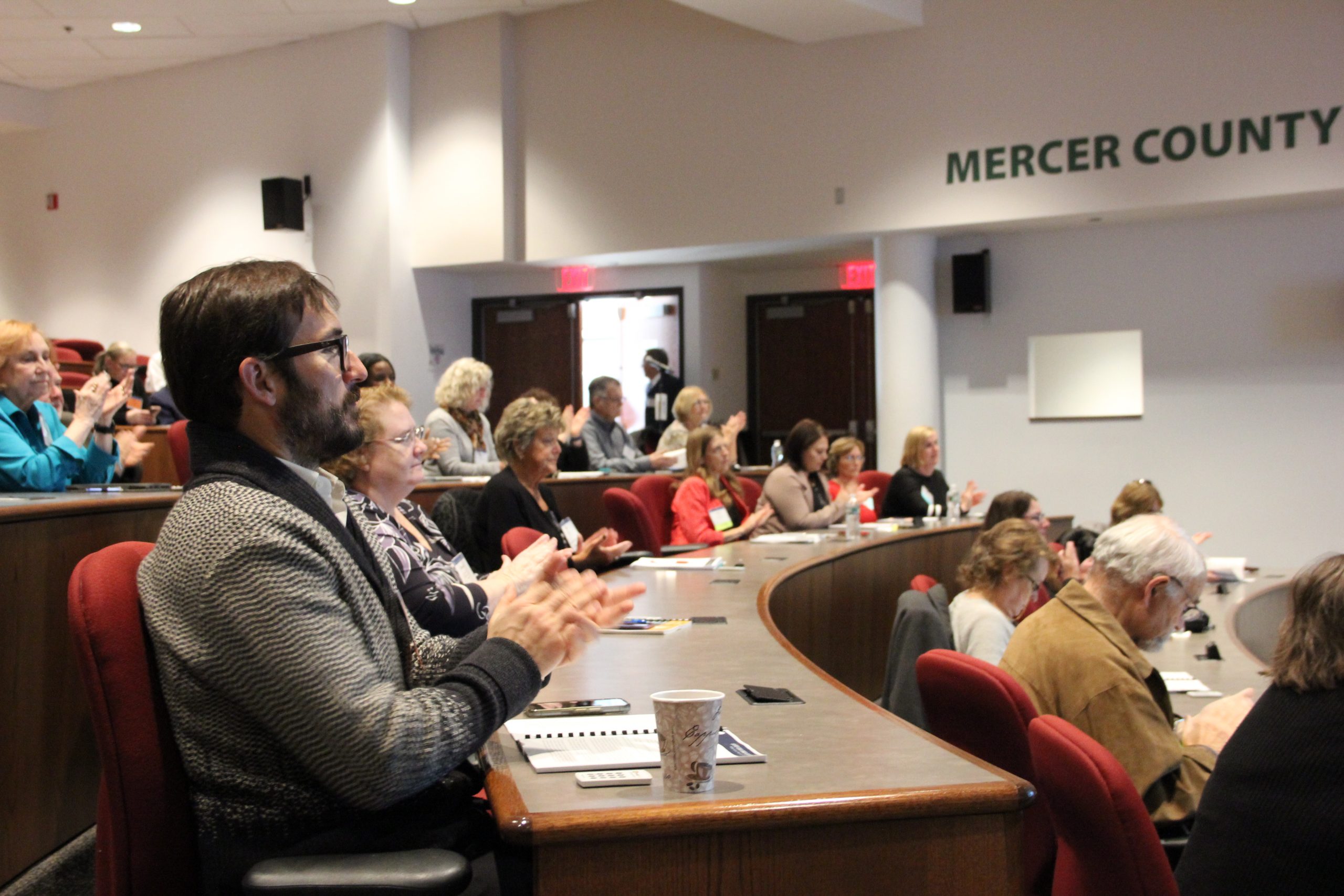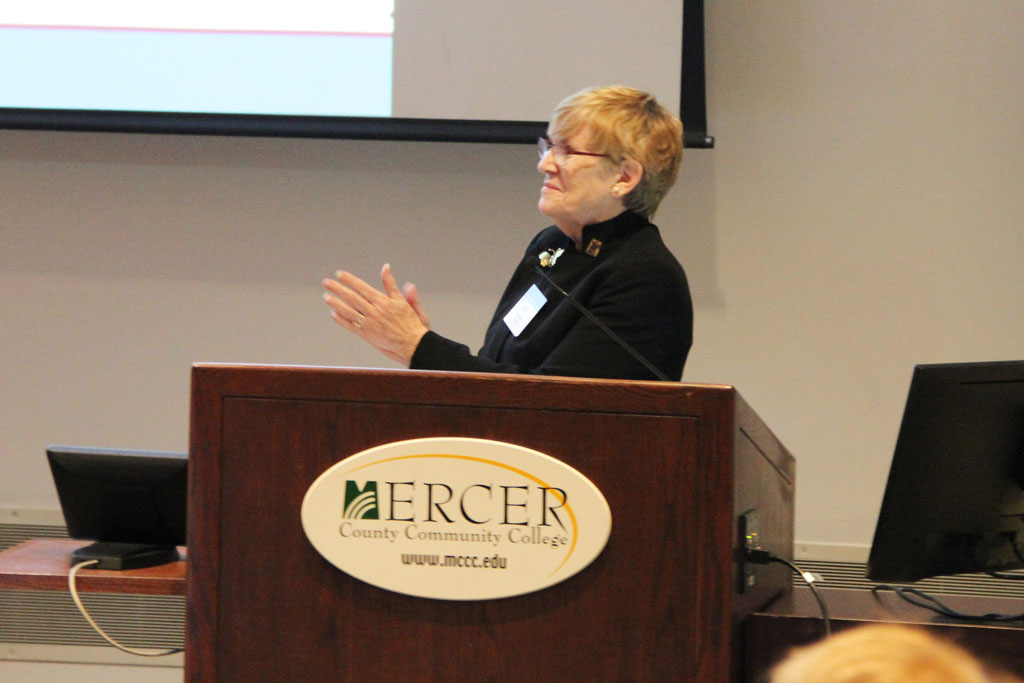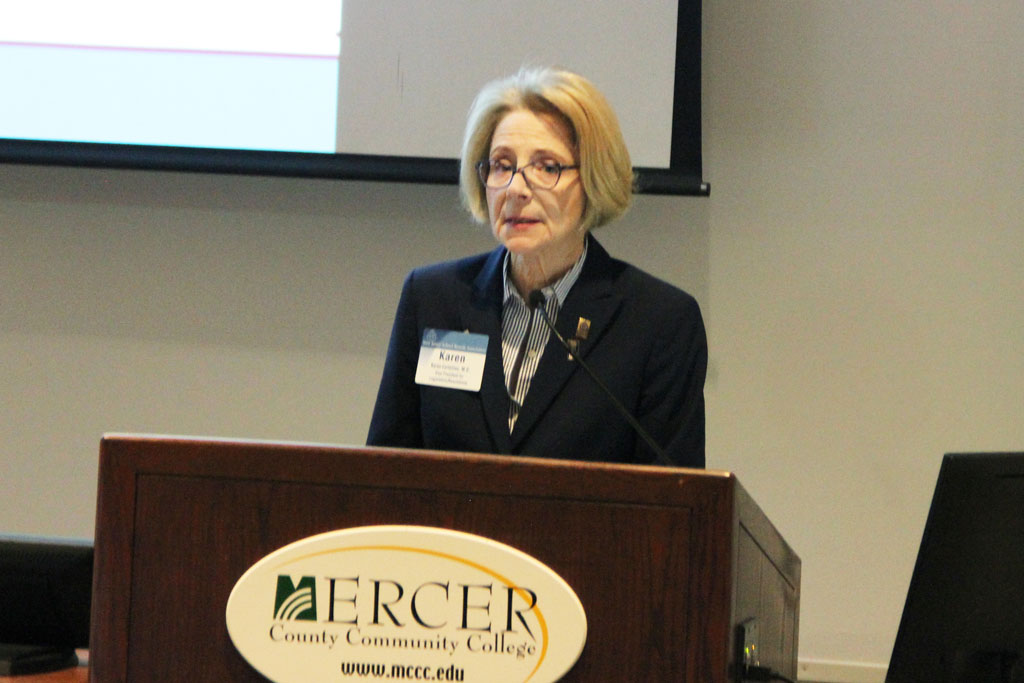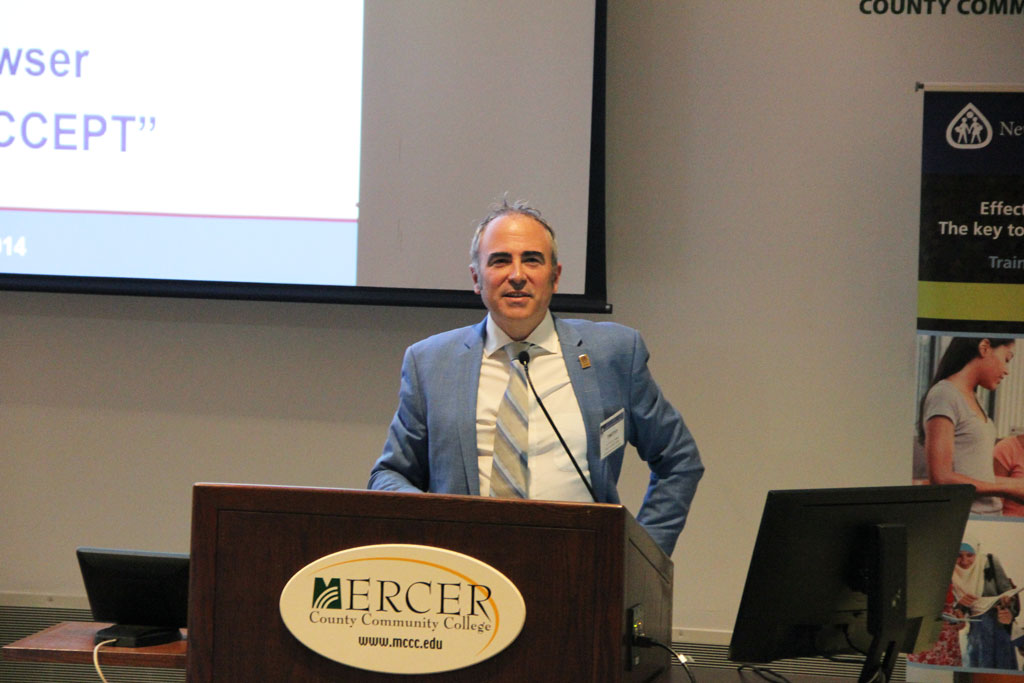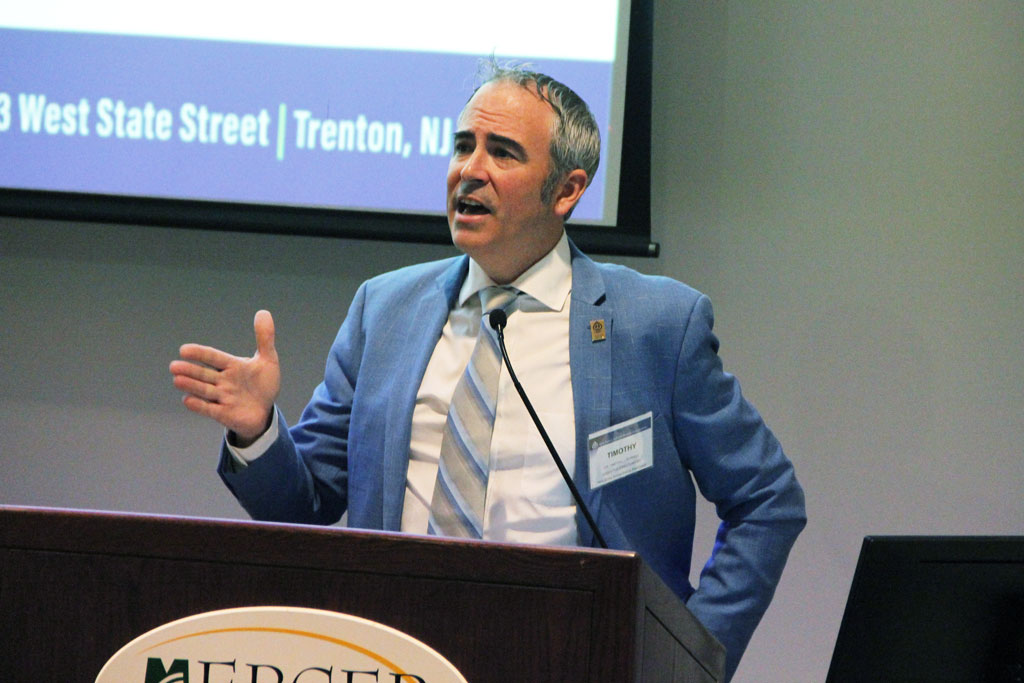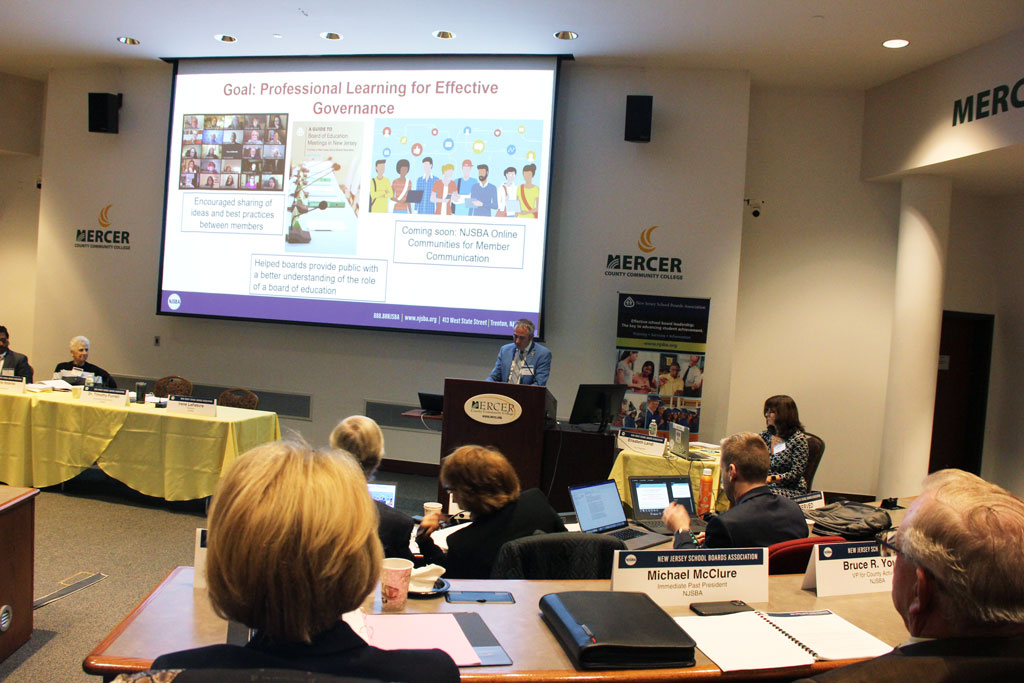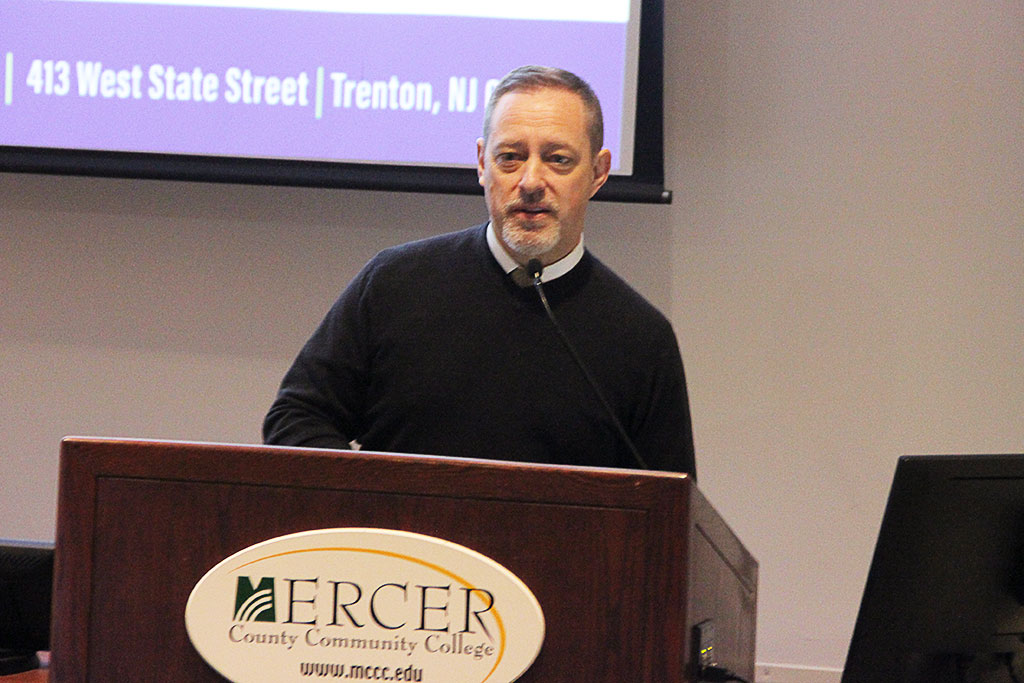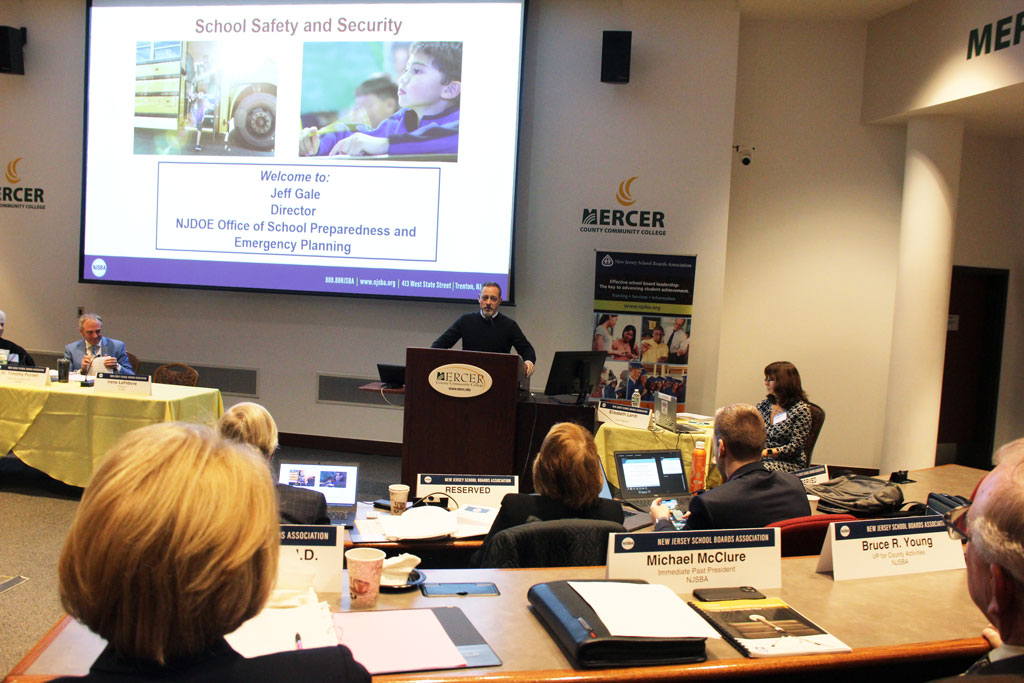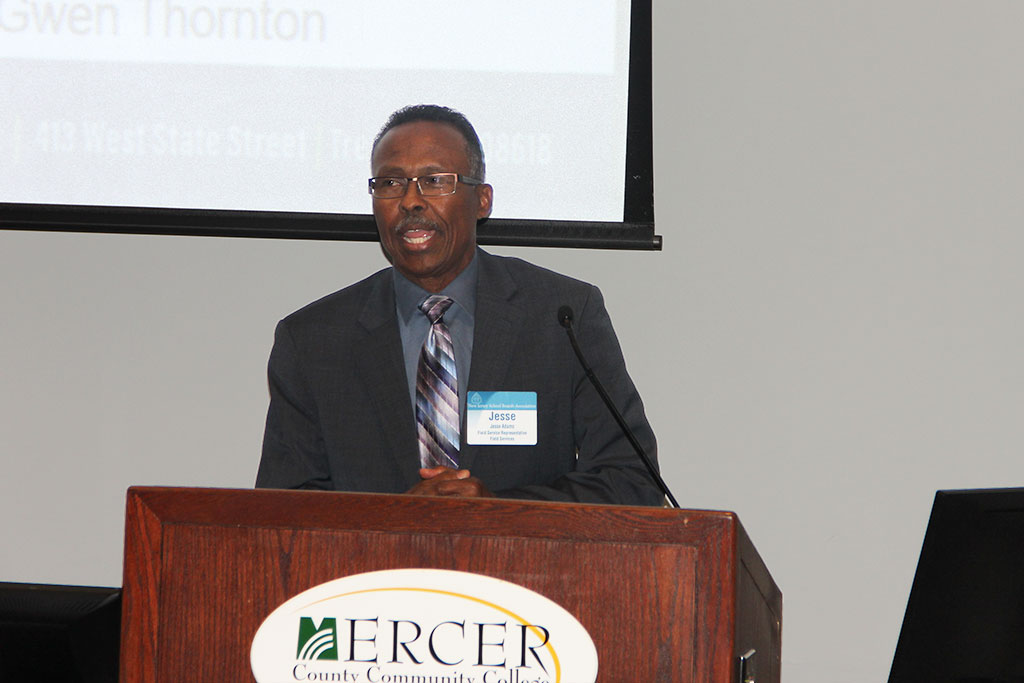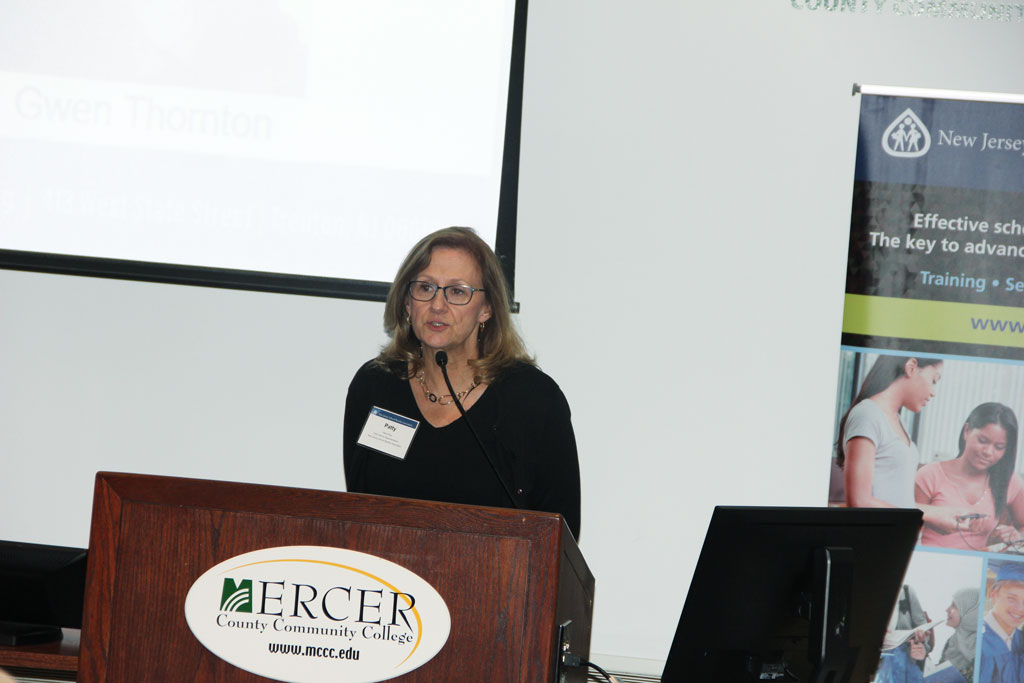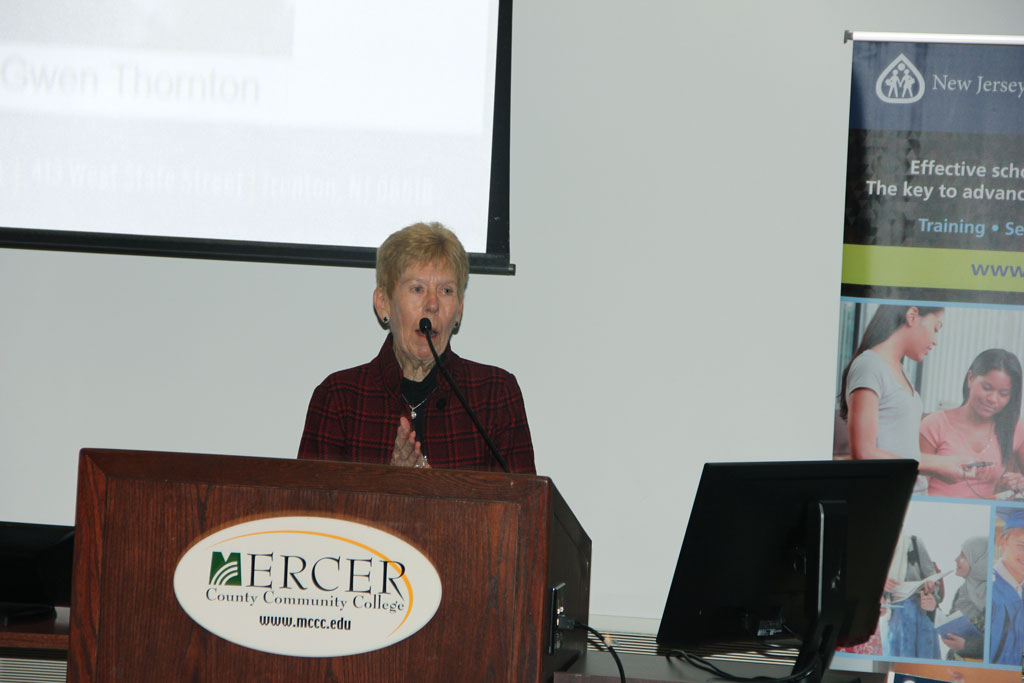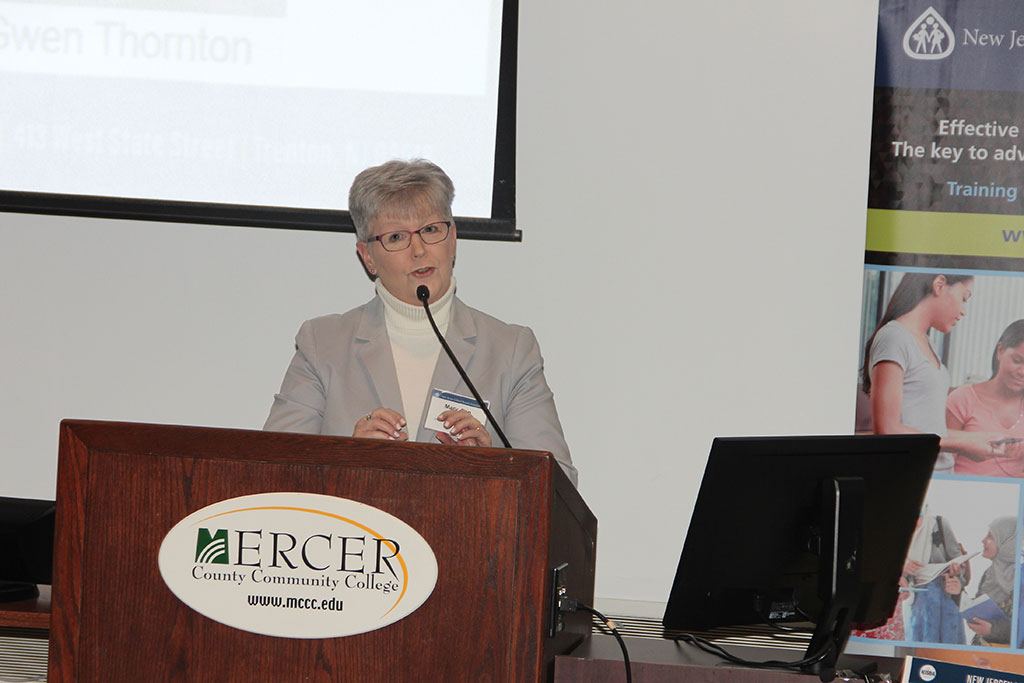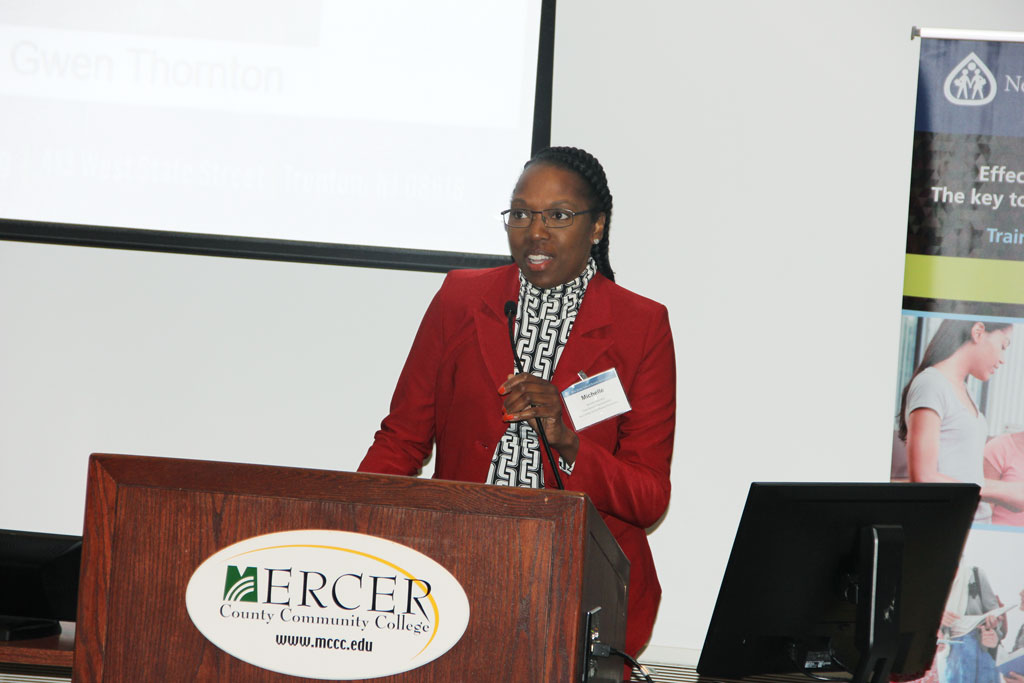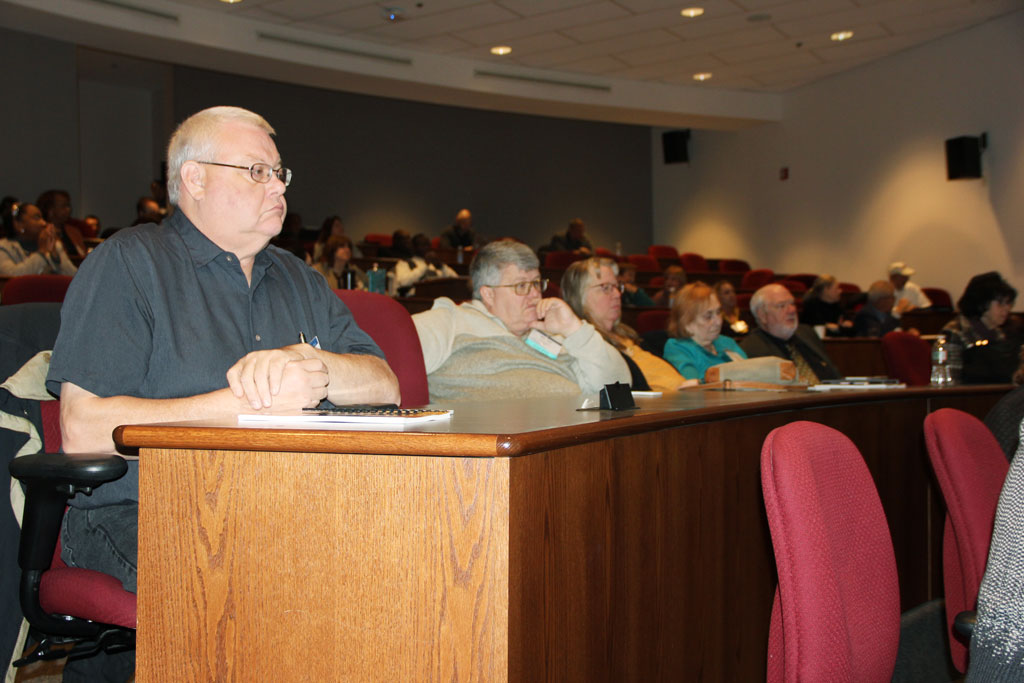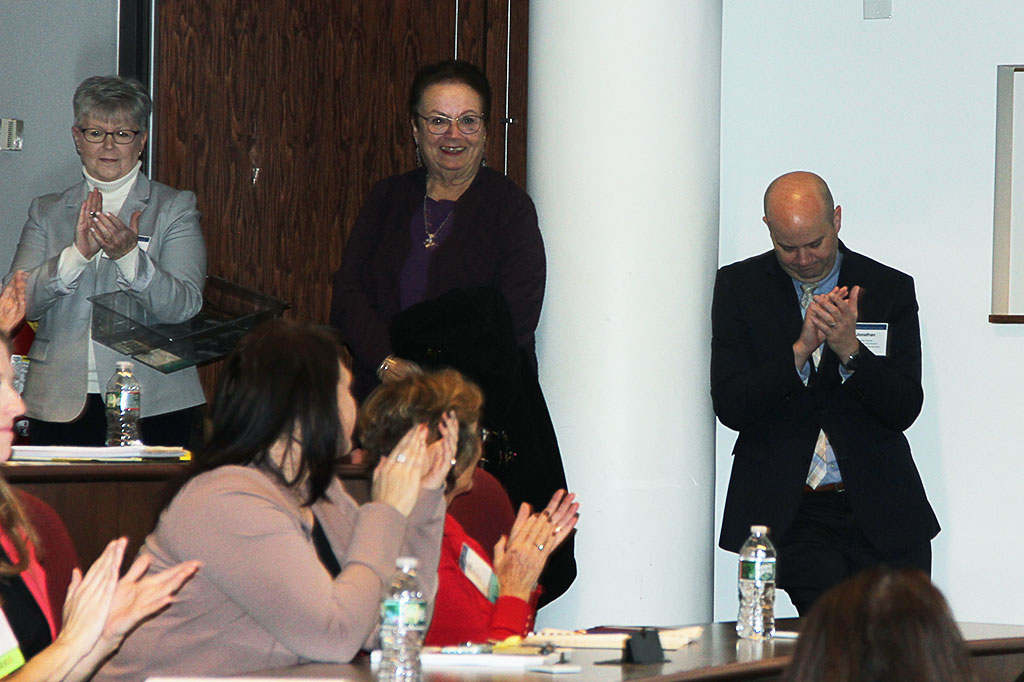The New Jersey School Boards Association celebrated the success of its first in-person Workshop in three years and officers and staff updated members on the Association’s strategic plan and tackled other important business at the Nov. 19 semiannual Delegate Assembly at the Conference Center at Mercer County Community College.
Irene LeFebvre, president of NJSBA, welcomed attendees to the auditorium, highlighting the success of Workshop, Oct. 24 to Oct. 26 at the Atlantic City Convention Center, which was co-sponsored by the New Jersey Association of School Business Officials and the New Jersey Association of School Administrators.
“Some 6,000 people attended – and I was pleased to see almost 4,000 of them came on the very first day. After so much time apart, it was clear that people wanted to be together from start to finish,” she said. “In fact, I think the only complaint I heard about Workshop is that a handful of sessions filled up too quickly. You’re doing something right when the chief complaint revolves around more people wanting to attend your training.”
The crowd applauded when LeFebvre recognized Lynn Anderson, senior manager of exhibits at NJSBA, who’ll be retiring in December after 43 years with the Association. “Ladies and gentlemen, I’m here to tell you that it is the Lynns of the world that make Workshop successful. Not the officers – it’s the staff,” LeFebvre said.
She also thanked Dr. Timothy Purnell, executive director of NJSBA, who joined the Association in July. She noted that he has renewed the Association’s focus on member service. “This is something that he’s laser-focused on as a leader,” she said, noting that Purnell is assessing which departments may need additional personnel to fulfill the growing needs of boards – particularly in the field services and legal and labor relations areas.
Michelle Bobrow, NJSBA’s parliamentarian, explained the rules of conduct of the meeting before turning over the lectern to Dr. Karen Cortellino, the Association’s vice president for legislation/resolutions, who noted that no emergency resolutions were to be considered.
She then moved for the body to consider a sunset review of the 6,000 and 7,000 series of codes in the Association’s manual of positions and policies on education, noting that staff had identified the policies that required reaffirmation. “With your consent, I propose that we consider all of the policies in the 6,000 and 7,000 series,” she said.
A motion was made to approve the reaffirmation of existing policies, which was carried. Purnell then delivered his executive director’s report.
A Privilege to Serve
Purnell began his remarks by recognizing a stalwart of the NJSBA staff, Steve McGettigan, the Association’s longtime senior manager of policy, who will soon be retiring.
“Steve has built up our Policy Department to what it is today,” Purnell said. “We owe Steve so much appreciation and gratitude for his hard work.”
It is an honor and privilege to serve local boards of education, Purnell said. “I do believe my position is one of servitude – that I am here to serve you, and in regard to that, I know we can improve,” he said, urging attendees to share any ideas or suggestions with him.
He echoed LeFebvre’s remarks on Workshop, noting that the staff deserves all the credit for making it such a resounding success. He added that he and the officers went to every single booth to thank the vendors for their participation. The event attracted 8,000 registrants, some 6,000 attendees, 351 vendors and had 68 sponsors, he said. He also highlighted the student performances, student film showcase, officers reception, art gallery, STEAM Tank and various other features that made Workshop a resounding success.
“We are already planning for Workshop 2023,” he said, noting that the Association will bring back the School Law Forum to cap the last day, which drew a hearty round of applause. “It was one of my favorite events as a superintendent when I attended,” Purnell said.
Purnell also celebrated the news that NJSBA circulated in a news release last week: Gov. Phil Murphy announced that the state would expand mental health services to a greater population of students in the state with the administration’s N.J. Statewide Student Support Services network, while maintaining the existing School Based Youth Services Program through fiscal year 2024 for those districts that currently participate in that program.
He called it “incredible news,” and highlighted that it came after NJSBA members sent comments to state officials and legislators after the Association sent out an action alert, urging them to voice concerns over discontinuing the School Based Youth Services Program. “It was that collective voice that gave us the power,” he said.
Purnell also highlighted how when the governor met Nov. 2 with members of the LEE Group, a group of New Jersey educational organizations, he urged the governor to provide additional financial consideration for New Jersey’s schools. LeFebvre was also at that meeting.
“We said, ‘Look, if we don’t, a lot of the creative and innovative programs you brought in during your term as governor are going to get cut because districts aren’t going to be able to afford them,” he said. “We want you to know where we stood on that – and we delivered that message personally to Gov. Murphy.”
Purnell noted some other recent positive legislative developments that the Association advocated for or supports, including a requirement for all high schools to have threat assessment teams in place and $45 million in grants to support schools in transitioning to electric school buses.
Next, Purnell updated members on the progress the Association has made on various items in its strategic plan, including the overarching goals of impacting opportunities for student growth, providing resources to boards to analyze and use data, offering professional learning opportunities for effective governance, engaging in effective advocacy and making advances in the area of technology.
One piece of news that generated some excitement from the crowd was Purnell’s announcement regarding a soon-to-be-released negotiations data portal, a new service the Association is providing only to members. The portal will help districts engaged in collective negotiations, allowing them to generate their own reports to get the most up-to-date data on labor trends throughout the state. It will include the ability to make comparisons by county and district size. “That is a game changer as far as I’m concerned,” he said.
Another new offering will come in the form of online communities to provide members with additional opportunities to network – something the Association expects to launch early next year. “For instance, new board members could have a community – and there could be a community exclusive only to board presidents,” Purnell said. “We can make communities based on your desire. You can log on from Bergen County and ask, ‘Does anyone have a new board member orientation agenda?’ and someone from Salem County could upload an agenda.”
Another new feature he’s excited about is a forthcoming “Zen Desk” that will allow board members to get a “ticket” when they reach out to the Call Center with a question or concern. The ticket will allow the caller to track the progress of their inquiry.
As for advocacy efforts, he noted that NJSBA is nonpartisan, and it makes its offerings bipartisan by design. “We want to make sure we have different voices because we represent every voice,” he said.
Purnell also shined a spotlight on the Association’s efforts in addressing school safety and security. “There is no greater task than to protect your staff and your students and ensure their safety regardless of what academic opportunities you have in your school,” he said.
He mentioned the Association’s recent webinars on the topic as well as two previous task force reports – and he noted that a new task force is being convened to further address the topic. He then introduced the meeting’s guest speaker, Jeff Gale, director of the Office of School Preparedness and Emergency Planning at the New Jersey Department of Education.
Gale, a former trooper with the New Jersey State Police, has been with the NJDOE for 11 years. One of the points he drove home is that school boards with questions about school safety should reach out to his office to see what training and support they may be able to get for free instead of paying a consultant or vendor.
“Please understand that where we are in New Jersey is far ahead of most states,” he said. “Our expertise is being sought around the country and the things we are doing here are modeled by other states. Please don’t make a phone call somewhere else without seeing what we can do first.”
Gale spent much of his time speaking about the law Murphy signed in August, requiring each school district and charter school to develop a policy for the establishment of a “threat assessment team” at each school beginning with the 2023-2024 school year. Gale’s office has been providing districts with training to create such teams and to learn how to engage in threat assessment.
The reason it’s so important for every school to have a team – not the district – is because the staff at the schools interact with students and know what is transpiring on a daily basis, Gale said. “With that in mind the school-based threat assessment team’s job is to recognize or identify students exhibiting concerning behaviors,” he said. Moreover, they are tasked with determining if those behaviors pose a risk to the students themselves or to others, he said.
The goal isn’t to identify students and punish them but to give them tools to handle whatever situation they are facing before something escalates, he said. “We need to know what is going on in their life – we need to know what their baseline behaviors are,” he said. “Is this person just quiet or have they suddenly become ostracized, are acting different and all alone?”
Students are searching for identity, looking for connectivity and also looking for purpose, and if they are adrift in any of those pursuits, there is the potential for them to handle it in an improper way, he said.
Field Service Representatives Share Their Passion to Serve
Next, Purnell invited some of the members of the field services team to share the many ways they can help board members accomplish their goals.
Kathy Helewa, senior manager of field services, who also is the field service representative for Passaic, Sussex and Warren counties, noted she is “humbled” to lead a team of such passionate and respected experts on governance.
Several members of her team came up to the lectern to share how much they love serving local boards of education and the various ways they can help boards carry out their mission.
“We are here to help you be an effective team governing your district,” said Jesse Adams Jr., a field service representative for Burlington, Camden and Mercer boards.” One of the ways to do that, he stressed, is by welcoming new members of the team and providing them with basic primer information. He highlighted some of the ways the department can help boards welcome new team members as well as the department’s strategic planning services.
Gwen Thornton, a field service representative who serves boards in Hunterdon and Somerset counties, noted that when a board member has a question that they don’t want to ask colleagues, they are welcome to reach out to her or any other field service representative. “We have sat where you are sitting,” she said (as every current NJSBA field service representative formerly served on a local board of education). “We know some of the challenges you are facing and can help you get answers to questions or guide you to other personnel in our Association.”
Mary Ann Friedman, a field service representative who serves Monmouth and Ocean counties, highlighted the importance of setting goals and how the team can help in that area as well. She noted that after setting goals, a board should provide updates on where it stands on them at least three times per year.
Charlene Peterson, who covers Essex and Morris counties, focused on the importance of evaluating the superintendent. “We have online confidential evaluation tools that allow every board member to have input into the process, evaluating performance against professional standards,” she said. The NJSBA, she noted, provides training on the process.
Michelle Kennedy, who serves boards in Atlantic, Cape May and Cumberland counties, focused on how the Association can help with superintendent searches. “We know the needs of your district and the needs of your community,” she said. Moreover, the Association provides onboarding assistance, something that separates it from other parties offering superintendent search services.
Patricia Rees, a field service representative for Hudson, Middlesex and Union counties, highlighted the ability for boards to achieve board certification. “When you have achieved board certification, you are recognized at a county meeting and we will also recognize you at a board meeting,” she said, adding that boards that are honored with the prestigious certification receive a plaque to display in their district.
“We love this work and love the fact you are doing this work for the children in your community,” Helewa said. “It is so gratifying to be in this room on a Saturday morning in a room full of people here for one reason: to support children and public education.”
Purnell closed the meeting by wishing attendees a happy Thanksgiving — and he thanked board members for all they do on a daily basis. “The efforts you have put forth at the local level and to benefit children are much appreciated and often unrecognized by your communities,” he said. “Turn to your neighbor and thank them.”
Purnell also challenged board members to express their thanks over the holiday to someone special, noting that his father, Dr. Robert E. Purnell, died last year. You never know when you’ll no longer have the opportunity to tell someone how much they mean to you, he said.
